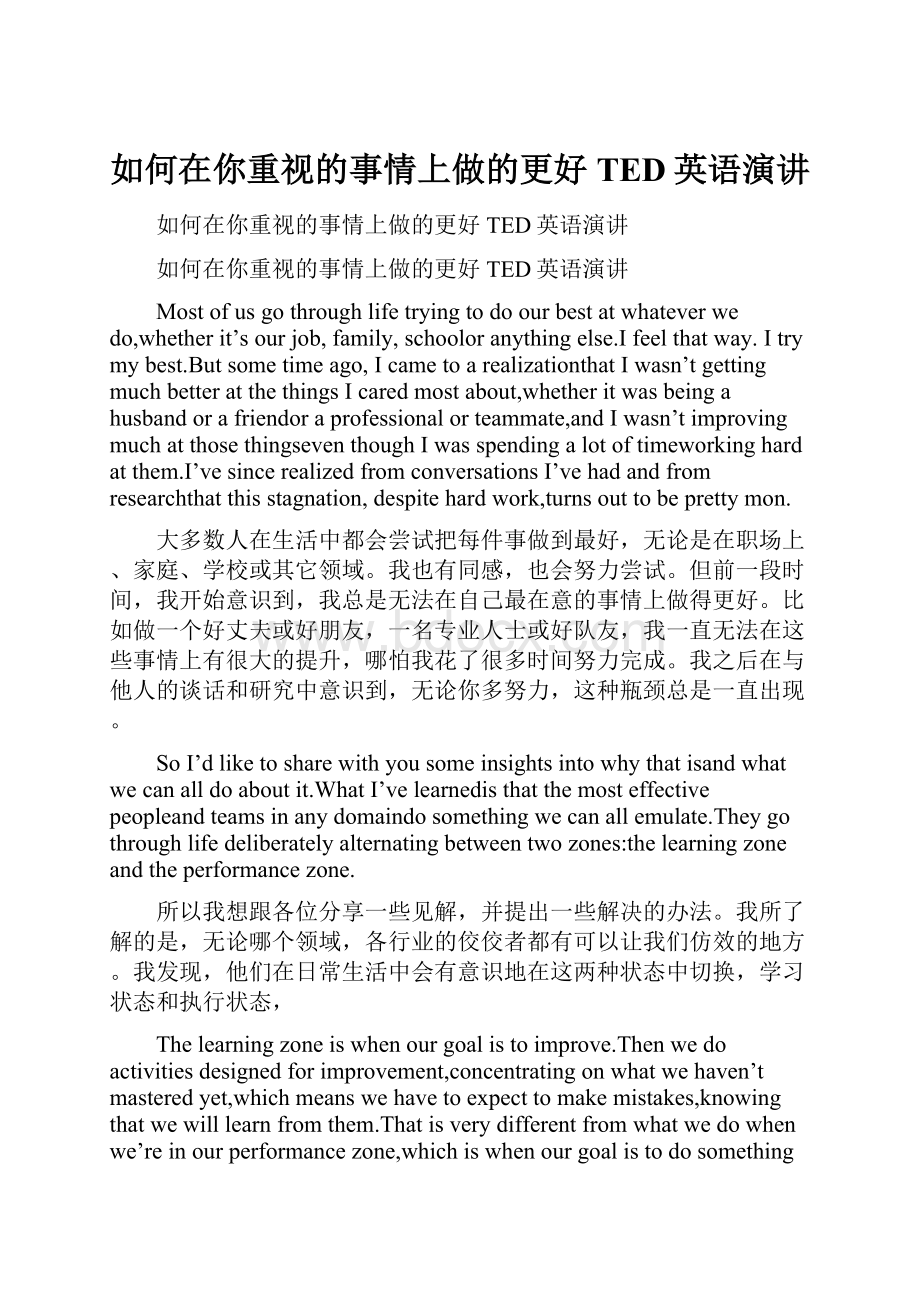如何在你重视的事情上做的更好TED英语演讲.docx
《如何在你重视的事情上做的更好TED英语演讲.docx》由会员分享,可在线阅读,更多相关《如何在你重视的事情上做的更好TED英语演讲.docx(9页珍藏版)》请在冰豆网上搜索。

如何在你重视的事情上做的更好TED英语演讲
如何在你重视的事情上做的更好TED英语演讲
如何在你重视的事情上做的更好TED英语演讲
Mostofusgothroughlifetryingtodoourbestatwhateverwedo,whetherit’sourjob,family,schooloranythingelse.Ifeelthatway.Itrymybest.Butsometimeago,IcametoarealizationthatIwasn’tgettingmuchbetteratthethingsIcaredmostabout,whetheritwasbeingahusbandorafriendoraprofessionalorteammate,andIwasn’timprovingmuchatthosethingseventhoughIwasspendingalotoftimeworkinghardatthem.I’vesincerealizedfromconversationsI’vehadandfromresearchthatthisstagnation,despitehardwork,turnsouttobeprettymon.
大多数人在生活中都会尝试把每件事做到最好,无论是在职场上、家庭、学校或其它领域。
我也有同感,也会努力尝试。
但前一段时间,我开始意识到,我总是无法在自己最在意的事情上做得更好。
比如做一个好丈夫或好朋友,一名专业人士或好队友,我一直无法在这些事情上有很大的提升,哪怕我花了很多时间努力完成。
我之后在与他人的谈话和研究中意识到,无论你多努力,这种瓶颈总是一直出现。
SoI’dliketosharewithyousomeinsightsintowhythatisandwhatwecanalldoaboutit.WhatI’velearnedisthatthemosteffectivepeopleandteamsinanydomaindosomethingwecanallemulate.Theygothroughlifedeliberatelyalternatingbetweentwozones:
thelearningzoneandtheperformancezone.
所以我想跟各位分享一些见解,并提出一些解决的办法。
我所了解的是,无论哪个领域,各行业的佼佼者都有可以让我们仿效的地方。
我发现,他们在日常生活中会有意识地在这两种状态中切换,学习状态和执行状态,
Thelearningzoneiswhenourgoalistoimprove.Thenwedoactivitiesdesignedforimprovement,concentratingonwhatwehaven’tmasteredyet,whichmeanswehavetoexpecttomakemistakes,knowingthatwewilllearnfromthem.Thatisverydifferentfromwhatwedowhenwe’reinourperformancezone,whichiswhenourgoalistodosomethingasbestaswecan,toexecute.Thenweconcentrateonwhatwehavealreadymasteredandwetrytominimizemistakes.
在学习状态,我们的技能可以进步。
我们会透过设计过的活动来提升技能。
专注于尚未掌握的事情,这意味着我们一定会有失误,但我们也一定能从中学到东西。
这跟我们执行状态时所做的事情很不一样,执行状态的目的是把我们最好的一面表现出来。
我们会专注在已经掌握好的技能,并把失误减到最小。
Bothofthesezonesshouldbepartofourlives,butbeingclearaboutwhenwewanttobeineachofthem,withwhatgoal,focusandexpectations,helpsusbetterperformandbetterimprove.Theperformancezonemaximizesourimmediateperformance,whilethelearningzonemaximizesourgrowthandourfutureperformance.Thereasonmanyofusdon’timprovemuchdespiteourhardworkisthatwetendtospendalmostallofourtimeintheperformancezone.Thishindersourgrowth,andironically,overthelongterm,alsoourperformance.
这两种状态都是我们生活的一部分,但当你想要自在的处在这两种状态,你得清楚知道你的目标、关注点、预期效果是什么,这样才能帮助你在执行和改进方面都做得更好。
执行状态注重当下的表现,学习状态会加速人的成长,并且提升未来的表现。
很多人,无论如何努力都没办法有所提高。
原因在于:
我们总是花费太多时间在执行状态。
这样会阻碍成长。
讽刺的是,长时间下来,也会引响我们的表现。
Sowhatdoesthelearningzonelooklike?
TakeDemosthenes,apoliticalleaderandthegreatestoratorandlawyerinancientGreece.Tobeegreat,hedidn’tspendallhistimejustbeinganoratororalawyer,whichwouldbehisperformancezone.Butinstead,hedidactivitiesdesignedforimprovement.Ofcourse,hestudiedalot.Hestudiedlawandphilosophywithguidancefrommentors,buthealsorealizedthatbeingalawyerinvolvedpersuadingotherpeople,sohealsostudiedgreatspeechesandacting.Togetridofanoddhabithehadofinvoluntarilyliftinghisshoulder,hepracticedhisspeechesinfrontofamirror,andhesuspendedaswordfromtheceilingsothatifheraisedhisshoulder,itwouldhurt.
那麽,学习状态是怎样的情况?
来看看狄摩西尼,这位政治领袖,古希腊最伟大的演说家和律师。
他会伟大的原因,不是因为他把时间都花在演说和执行律师业务上面,也就是说他不会一直处在执行状态。
相反的,他做了很多改善的活动。
毋庸置疑,他花很多时间在学习。
比如他在精神导师的指导下学习法律及哲学,但他也同时意识到,作为律师他需要说服别人,所以他也研究名人的演讲及学习演戏。
为了改变不由自主耸肩的坏习惯,他会在镜子前练习演说,并且在天花板上吊一把剑。
一旦耸肩,他就会被刺到。
(Laughter)
(观众笑)
Tospeakmoreclearlydespitealisp,hewentthroughhisspeecheswithstonesinhismouth.Hebuiltanundergroundroomwherehecouldpracticewithoutinterruptionsandnotdisturbotherpeople.Andsincecourtsatthetimewereverynoisy,healsopracticedbytheocean,projectinghisvoiceabovetheroarofthewaves.
为了克服口齿不清,他会含着石头练习演讲。
他还建了一个地下室,以避免练习时被打扰或打扰到别人。
因为上法院时会很吵,所以他就对着大海练习,让自己的声音比咆哮的海浪还大声。
Hisactivitiesinthelearningzonewereverydifferentfromhisactivitiesincourt,hisperformancezone.Inthelearningzone,hedidwhatDr.AndersEricssoncallsdeliberatepractice.Thisinvolvesbreakingdownabilitiesintoponentskills,beingclearaboutwhatsubskillwe’reworkingtoimprove,likekeepingourshouldersdown,givingfullconcentrationtoahighlevelofchallengeoutsideourfortzone,justbeyondwhatwecancurrentlydo,usingfrequentfeedbackwithrepetitionandadjustments,andideallyengagingtheguidanceofaskilledcoach,becauseactivitiesdesignedforimprovementaredomain-specific,andgreatteachersandcoachesknowwhatthoseactivitiesareandcanalsogiveusexpertfeedback.Itisthistypeofpracticeinthelearningzonewhichleadstosubstantialimprovement,notjusttimeontaskperforming.Forexle,researchshowsthatafterthefirstcoupleofyearsworkinginaprofession,performanceusuallyplateaus.Thishasbeenshowntobetrueinteaching,generalmedicine,nursingandotherfields,andithappensbecauseoncewethinkwehavebeegoodenough,adequate,thenwestopspendingtimeinthelearningzone.Wefocusallourtimeonjustdoingourjob,performing,whichturnsoutnottobeagreatwaytoimprove.Butthepeoplewhocontinuetospendtimeinthelearningzonedocontinuetoalwaysimprove.Thebestsalespeopleatleastonceaweekdoactivitieswiththegoalofimprovement.Theyreadtoextendtheirknowledge,consultwithcolleaguesordomainexperts,tryoutnewstrategies,solicitfeedbackandreflect.Thebestchessplayersspendalotoftimenotplayinggamesofchess,whichwouldbetheirperformancezone,buttryingtopredictthemovesgrandmastersmadeandanalyzingthem.Eachofushasprobablyspentmany,many,manyhourstypingonaputerwithoutgettingfaster,butifwespent10to20minuteseachdayfullyconcentratingontyping10to20percentfasterthanourcurrentreliablespeed,wewouldgetfaster,especiallyifwealsoidentifiedwhatmistakeswe’remakingandpracticedtypingthosewords.That’sdeliberatepractice.
他在学习状态所做的活动与他在法院上执行的活动,两者是很不一样的。
他在学习状态时,会做安德森·爱立信博士所说的「循序渐进的练习」。
就是把要学习的技能拆分成一小段一小段的技能,并且清楚地知道哪一项技巧目前需要提高。
像是放松肩膀,全新专注在舒适圈以外更高层次的`挑战,专注超越那些早已掌握的事物。
利用快速反馈做重复练习和调整,全力配合熟手教练的指导。
因为,为改善而设计的活动是有特定范围的,好的老师或教练知道什么活动能带来进步,并会给予专业的反馈。
就是在这种学习状态下的练习,才能大量的进步,而不是只是花时间在执行业务上。
举个例子,研究表明,在某一领域工作数年后,表现会达到停滞期。
这在教学、一般内科、护理及其他领域都得到了印证。
这是因为一旦人们觉得自己足够好了,绰绰有余了,就不会再花时间学习。
我们只会关注在如何完成工作和执行业务上,这种方式变得不利于提高技能。
但是那些一直在学习的人们,就会持续地成长。
最好的销售人员,至少每周一次,进行改善训练。
他们阅读以增长知识,咨询同行和专家、尝试新的策略、征询意见及反思。
最好的棋手,大部分的时间,并不是在跟别人下棋,也就是他们不会一直处在执行的状态,而是试图预测并分析大师们的棋路。
每个人可能都花了很多时间在电脑前打字,但却没有越打越快。
但是,如果我们每天抽出10-20分钟,全神贯注地提升打字速度,比平常快上10%-20%就好,我们的速度就会越来越快。
特别是当我们能找到失误,并且专注加以练习。
这就是一种循序渐进(刻意)的练习。
Inwhatotherpartsofourlives,perhapsthatwecaremoreabout,areweworkinghardbutnotimprovingmuchbecausewe’realwaysintheperformancezone?
Now,thisisnottosaythattheperformancezonehasnovalue.Itverymuchdoes.WhenIneededakneesurgery,Ididn’ttellthesurgeon,Pokearoundinthereandfocusonwhatyoudon’tknow.
在生活的其他方面,还有哪些是我们比较在意,我们很努力但进步缓慢的地方?
是不是因为我们老是停留在执行状态里?
但以上都不是在说执行状态没有用,它是很有价值的。
但我需要做膝盖手术的时候,我可不想告诉医师:
「随便戳戳吧,探索一下你不知道的事。
」
(Laughter)
(观众笑)
We’lllearnfromyourmistakes!
IlookedforasurgeonwhoIfeltwoulddoagoodjob,andIwantedhertodoagoodjob.Beingintheperformancezoneallowsustogetthingsdoneasbestaswecan.Itcanalsobemotivating,anditprovidesuswithinformationtoidentifywhattofocusonnextwhenwegobacktothelearningzone.Sothewaytohighperformanceistoalternatebetweenthelearningzoneandtheperformancezone,purposefullybuildingourskillsinthelearningzone,thenapplyingthoseskillsintheperformancezone.
「我们可以从失误中学到东西啊!
」我会找一位我认为够好的医师,我想让她好好地帮我医治。
在执行状态时,我们会力求表现到最好,这样可以激励我们,并告诉我们,在回到学习状态的时候,该关注些什么。
所以说,想要表现得好需要在学习状态和执行状态之间转换。
在学习状态下有目的性地积累技巧,然后再将之应用在执行状态里。
WhenBeyoncéisontour,duringtheconcert,she’sinherperformancezone,buteverynightwhenshegetsbacktothehotelroom,shegoesrightbackintoherlearningzone.Shewatchesavideooftheshowthatjustended.Sheidentifiesopportunitiesforimprovement,forherself,herdancersandhercamerastaff.Andthenextmorning,everyonereceivespagesofnoteswithwhattoadjust,whichtheythenworkonduringthedaybeforethenextperformance.It’saspiraltoever-increasingcapabilities,butweneedtoknowwhenweseektolearn,andwhenweseektoperform,andwhilewewanttospendtimedoingboth,themoretimewespendinthelearningzone,themorewe’llimprove.
就像碧昂斯的巡演,演唱会上,她处在执行表演的状态,但每晚回到酒店,她就直接投入到学习状态里。
她会观看刚刚结束的表演,为自己、舞群和摄像师,寻找改进的机会。
第二天早上,所有人都会收到一份通知,上面写着那些地方需要改进,如此团队成员就可以在下一次表演之前做出调整。
如此团队的能力就可以一直向上提升。
但我们需要清楚的是,何时「学」、何时「做」,何时两样一起。
投入越多时间在学习状态,就能取得越多的进步。
Sohowcanwespendmoretimeinthelearningzone?
First,wemustbelieveandunderstandthatwecanimprove,whatwecallagrowthmindset.Second,wemustwanttoimproveatthatparticularskill.Therehastobeapurposewecareabout,becauseittakestimeandeffort.Third,wemusthaveanideaabouthowtoimprove,whatwecandotoimprove,nothowIusedtopracticetheguitarasateenager,performingsongsoverandoveragain,butdoingdeliberatepractice.Andfourth,wemustbeinalow-stakessituation,becauseifmistakesaretobeexpected,thentheconsequenceofmakingthemmustnotbecatastrophic,orevenverysignificant.Atightropewalkerdoesn’tpracticenewtrickswithoutaunderneath,andanathletewouldn’tsetouttofirsttryanewmoveduringachionshipmatch.
那麽我们要怎样才能多花点时间在学习状态呢?
首先,要相信并理解一件事,那就是我们可以改进,也就是所谓的「成长心态」。
其次,要在具体的技巧上做改进。
并且要有一个我们在乎的目标,因为它需要时间和努力。
第三,我们必须要知道该如何提升,要做些什么来提升,而不是像我年轻时弹吉它那样,同首曲子一遍又一遍的重复,而是要做「循序渐进的练习」。
第四,我们必须保持在低风险状态,因为如果如预期的发生了失误,那麽造成的后果就不会影响太大,或是关系重大。
走钢丝的演员,不会在没有护网的情况下练习新的技巧;运动员并不会在冠军比赛中,尝试新的动作。
Onereasonthatinourliveswespendsomuchtimeintheperformancezoneisthatourenvironmentsoftenare,unnecessarily,highstakes.Wecreatesocialrisksforoneanother,eveninschoolswhicharesupposedtobeallaboutlearning,andI’mnottalkingaboutstandardizedtests